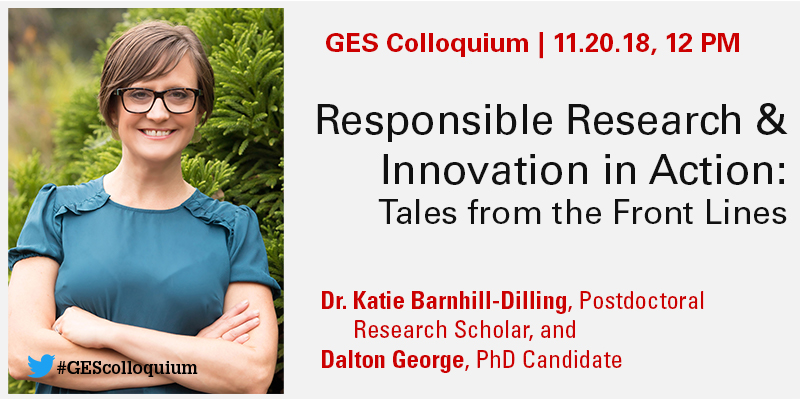
- This event has passed.
Katie Barnhill-Dilling & Dalton George – Responsible Research & Innovation in Action: Tales from the Front Lines
November 20, 2018 @ 12:00 pm - 1:00 pm

GES Colloquium | YouTube: LIVE STREAM
Responsible Research & Innovation in Action: Tales from the Front Lines
Speakers:
Dr. Katie Barnhill-Dilling, Postdoctoral Research Scholar (email, Twitter @barnhilldilling) and Dalton George, PhD Candidate (email)
Abstract:
Responsible research and innovation (RRI) is an increasingly applied normative framework for the governance of emerging technologies. However, meaningful implementation of RRI principles can be challenging, particularly with respect to upstream stakeholder and community engagement. The Safe Genes NCSU project, “Restoring Ecosystems and Biodiversity through Development of Safe and Effective Gene Drive Technologies,” has been designed with RRI in mind. The project attends specifically to regulatory, stakeholder, and community engagement, as well as risk assessment, in parallel with its technological and biological tasks. In other words, stakeholders and communities are being engaged as the technology is still being developed. What sorts of challenges and opportunities does this approach to a project present? What can we learn about the implementation of Responsible Research & Innovation that may serve future projects?
Bio
Dr. Barnhill-Dilling is a Postdoctoral Research Scholar in the Department of Biological Sciences at North Carolina State University where she serves as Project Coordinator for the Safe Genes project entitled “Restoring Ecosystems and Biodiversity through Development of Safe and Effective Gene Drive Technologies.” Using the analytical tools of Science, Technology, & Society and Environmental Justice, her research explores the governance of genetic engineering for biodiversity conservation and ecological restoration with a particular focus on community, stakeholder, and public engagement. She earned her PhD in Forestry & Environmental Resources at North Carolina State University in May 2018, and was a 2016-17 NSF IGERT Fellow with the GES Center.